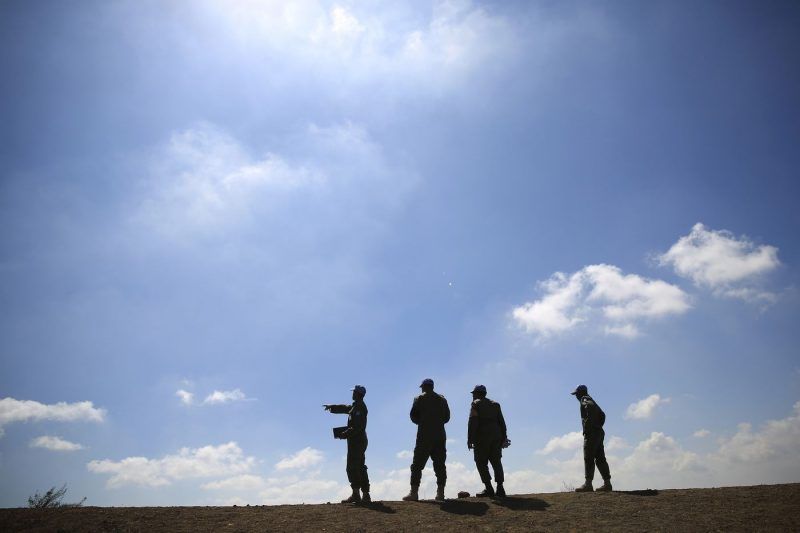
In mid-August, two United Nations peacekeepers from Burkina Faso were killed and several wounded in a suicide attack in the Timbuktu region of northern Mali. In early September, also in Mali, four peacekeeping troops from Chad lost their lives and many were injured when their convoy hit a mine.
This brings the total number of U.N. personnel who have died so far this year due to hostile action to 12; last year, 36 lost their lives. In addition, in late August, 45 U.N. peacekeepers from Fiji monitoring the Golan Heights were seized by a Syrian militant group allied with Al Qaeda and held as hostages for two weeks before being released Sept. 11.
In short, the U.N.'s famed corps of neutral troops and observers has been under attack around the globe.
Most U.N. peacekeeping enterprises have taken place under extraordinarily tricky and dangerous conditions. That's not surprising since they are looking after openly contested terrain in the aftermath of vicious conflicts.
Today, there are more than 100,000 U.N. peacekeepers, uniformed and civilian, in the field. There are 17 missions; the longest has lasted 66 years (in the Middle East involving Israel and its Arab neighbors); others are more recent, such as Mali in 2013 and the Central African Republic this year. The remainder are Afghanistan, the Ivory Coast, Haiti, Darfur, the Republic of the Congo, Abyei in Sudan, South Sudan, Western Sahara, Lebanon, Kosovo, Liberia, India-Pakistan (since 1949) and the Golan Heights.
The U.N. peacekeeping budget is about $7 billion a year. The United States is the largest financial contributor to the operations, though it disputes some of its share of the costs and still lags in its payments.
All missions are authorized by the U.N. Security Council. The warring parties agree in advance to the U.N. presence. Some U.N. interventions are primarily enforcement actions, with armed U.N. forces who are prepared to fight; others are strictly observer missions. Most of the troops hail from poor nations. Indeed, working for the United Nations in this capacity is sometimes a way for impoverished young men to make a decent living.
Peacekeeping began more than 61/2 decades ago when the organization stationed observers to watch over the truce lines between Israel and its Arab adversaries, and between Pakistan and India in Kashmir.
The notion of peacekeeping was not in the original U.N. Charter. It grew out of the demands of the times as countries sought impartial observers to enforce cease-fires, and the U.N. responded under its charge to take collective action "to maintain international peace and security," asking its member states for volunteers. In the ensuing years, 122 countries have contributed troops to the missions; there have been 69 operations; and more than 3,000 men and women have died.
One example of this important but dangerous duty is the mission in the Golan Heights, which has operated there since 1974, after the end of the Yom Kippur War. It keeps safe a buffer zone between Syria and Israel, helping forestall the outbreak of renewed hostilities between the nations. But in March 2013, a group of Syrian rebels held more than 21 Golan-based U.N. personnel from the Philippines as hostages until Jordanian officials negotiated their release.
The individuals in these operations customarily acquit themselves with courage and discipline. However, sometimes they have become the central story, as when peacekeepers have been involved in rapes, sexual abuse, theft and even murder. A contingent of Nepalese soldiers serving in Haiti were said to have spread cholera among the Haitian population, resulting in the deaths of thousands of people in recent years. But bad behavior has grown rarer because of newly enforced controls over operations.
By and large, the world should be grateful for what the United Nations is doing. These employees risk their lives to make sure that at least a few global conflagrations don't erupt again into bloody mayhem and spin out of control. Their presence also has the incidental effect of saving the United States, in particular, from having to send in its own troops to keep the peace.
Still, the missions seem to get at best only cursory attention from the global community — and usually only when peacekeepers come under attack, are detained or are killed. As the world grows more dangerous, the role of peacekeepers will only become more vital. Member states of the U.N. should keep up their financial and political support for the operations to ensure the planet's safety for the coming decades.
Stephen Schlesinger, a historian and fellow at the Century Foundation, is the author of Act of Creation about the founding of the United Nations.
